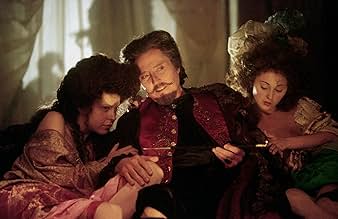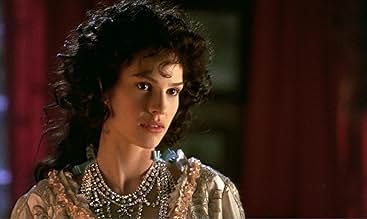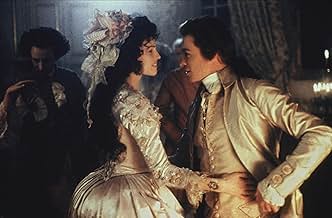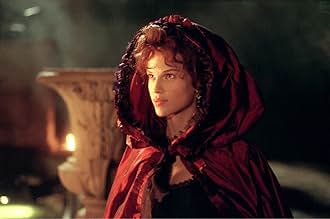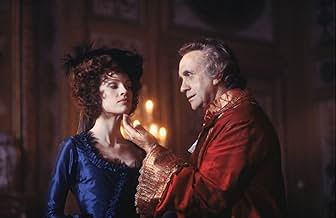IMDb RATING
6.0/10
5.7K
YOUR RATING
In pre-Revolutionary France, a young aristocratic woman left penniless by the political unrest in the country must avenge her family's fall from grace by scheming to steal a priceless neckla... Read allIn pre-Revolutionary France, a young aristocratic woman left penniless by the political unrest in the country must avenge her family's fall from grace by scheming to steal a priceless necklace.In pre-Revolutionary France, a young aristocratic woman left penniless by the political unrest in the country must avenge her family's fall from grace by scheming to steal a priceless necklace.
- Nominated for 1 Oscar
- 1 win & 2 nominations total
- Director
- Writer
- All cast & crew
- Production, box office & more at IMDbPro
Featured reviews
Certainly the true story of "The Affair of the Necklace" is one of the most fascinating in all history, and despite a lot of problems, this 2001 film, deriving its name from said affair, is interesting if misguided. The director seemed to want a sexually-charged drama, though he didn't get one. The casting is odd, starring Hilary Swank as Comtesse Jeanne LaMotte. She doesn't have enough European sensibility. Adrien Brody plays her cavorting husband and doesn't seem to get the period either. As Cardinal Rohan, however, Jonathan Pryce is very good, as are some of the performances in the smaller roles.
There are lots of complaints on this board about the accents, which goes to show you that this film failed on a few levels - people would probably not be mentioning accents if they'd really loved this movie. First of all, there isn't anything wrong with the accents, not the accents themselves or the variety of them. Films have mixed accents for years. For those who think everyone should have been speaking with a French accent, think again. The theatrical rule: if you are playing a foreigner living in his own country, say France, he is not speaking English with a French accent; he is speaking his native tongue; therefore, no accent is required. Were this not the case, all Chekov plays would be performed with the actors using thick Russian accents just as one example. Many actors use the more attractive British accent instead. Maybe there could have been more uniformity, but you can say that about any WWII propaganda film, where Hollywood hired actual foreigners to work among the Americans.
I actually found the movie intriguing, as it's a great story, even if it wasn't told particularly well. It did deviate from the truth quite a bit, though. LaMotte was not as she was portrayed. She came from a poor family but was of royal blood, and what she wanted was a good-sized pension from the Queen (here Joely Richardson, no teen queen), who ignored her as in the film. Jeanne's plot consisted of the forged letters by Marie asking Cardinal Rohan, in actuality Jeanne's lover, to lend her the money, not just guarantee the payments. Louis and Marie wanted a public trial not just because the Affair of the Necklace had further destroyed Marie's reputation, but because France was abuzz with the rumor than Jeanne was Marie's lover. As in the film, Marie did wind up in England and write her memoirs, but they were filled with stories of a lesbian relationship between her and Marie Antoinette.
In portraying Jeanne as somehow sympathetic - denied her place in society, as well as her home and her name, and watching her father (who was in reality a drunk) killed by soldiers - a lot of the teeth is taken out of the story. While 1938's "Marie Antoinette" makes Marie a heroine, this one portrays her as a cold bitch. Selfish and shallow she certainly was and like much of history's royalty, completely out of touch with her people - but Jeanne was no saint either. A more accurate telling of this story would make for a much better drama.
There are lots of complaints on this board about the accents, which goes to show you that this film failed on a few levels - people would probably not be mentioning accents if they'd really loved this movie. First of all, there isn't anything wrong with the accents, not the accents themselves or the variety of them. Films have mixed accents for years. For those who think everyone should have been speaking with a French accent, think again. The theatrical rule: if you are playing a foreigner living in his own country, say France, he is not speaking English with a French accent; he is speaking his native tongue; therefore, no accent is required. Were this not the case, all Chekov plays would be performed with the actors using thick Russian accents just as one example. Many actors use the more attractive British accent instead. Maybe there could have been more uniformity, but you can say that about any WWII propaganda film, where Hollywood hired actual foreigners to work among the Americans.
I actually found the movie intriguing, as it's a great story, even if it wasn't told particularly well. It did deviate from the truth quite a bit, though. LaMotte was not as she was portrayed. She came from a poor family but was of royal blood, and what she wanted was a good-sized pension from the Queen (here Joely Richardson, no teen queen), who ignored her as in the film. Jeanne's plot consisted of the forged letters by Marie asking Cardinal Rohan, in actuality Jeanne's lover, to lend her the money, not just guarantee the payments. Louis and Marie wanted a public trial not just because the Affair of the Necklace had further destroyed Marie's reputation, but because France was abuzz with the rumor than Jeanne was Marie's lover. As in the film, Marie did wind up in England and write her memoirs, but they were filled with stories of a lesbian relationship between her and Marie Antoinette.
In portraying Jeanne as somehow sympathetic - denied her place in society, as well as her home and her name, and watching her father (who was in reality a drunk) killed by soldiers - a lot of the teeth is taken out of the story. While 1938's "Marie Antoinette" makes Marie a heroine, this one portrays her as a cold bitch. Selfish and shallow she certainly was and like much of history's royalty, completely out of touch with her people - but Jeanne was no saint either. A more accurate telling of this story would make for a much better drama.
I have to disagree with just about every critic in the world. I completely love this movie. (No spoilers that wouldn't come from a preview or the back of the movie box included)
True, there is constant voice-over narriation. But this based-on-a-true-story-scandal movie involves a complicated plot. Without the help of one of our tried-and-true secondary characters. The historical characters, though obviously given modern color, are convincingly portrayed. Hilary Swank gives innocent looks as she lies shamelessly. As the plot thickens, so does the number of fun players. Christopher Walken seems to relish in his part of mystical cheater. Adrian Brody seems to really enjoy playing the philandering jerk, banging back whiskey and happily flirting with all young actresses (street-walkers) he sees. Jonathan Pryce actually made me fear him as the corrupt cardinal. Impressive from the man I last saw as the kindly father in Pirates of the Carribean.
The most lovable character, by far, is Retaux. The cheerful court-wise gigilo mutters some of the funniest lines in the movie, and runs a full gamut of emotions, from flirtatious to distraught.
Joely Richardson plays a WONDERFUL ultimately doomed by history queen. Her sweet naievety combined with indifferent ignorance paints a reasonably possible image of the French monarchy at the time.
Oh sure, the movie's not totally perfect. Really, there are two things that bothered me. (1) The all over the place accents. But I'm willing to forgive it. After all, the movie's set in France. They're not speaking French, so they're not going to fool me into thinking they're French anyway. (2) The sunglasses worn by Joely Richardson and Christopher Walken. Quite forgivable, but still made my eyebrows raise.
On the whole this movie exceeded my expectations tenfold. The great costumes, powerful music, and tense time period give the actors a playground where it's next to impossible to fall flat. But not a one of them would have anyway.
True, there is constant voice-over narriation. But this based-on-a-true-story-scandal movie involves a complicated plot. Without the help of one of our tried-and-true secondary characters. The historical characters, though obviously given modern color, are convincingly portrayed. Hilary Swank gives innocent looks as she lies shamelessly. As the plot thickens, so does the number of fun players. Christopher Walken seems to relish in his part of mystical cheater. Adrian Brody seems to really enjoy playing the philandering jerk, banging back whiskey and happily flirting with all young actresses (street-walkers) he sees. Jonathan Pryce actually made me fear him as the corrupt cardinal. Impressive from the man I last saw as the kindly father in Pirates of the Carribean.
The most lovable character, by far, is Retaux. The cheerful court-wise gigilo mutters some of the funniest lines in the movie, and runs a full gamut of emotions, from flirtatious to distraught.
Joely Richardson plays a WONDERFUL ultimately doomed by history queen. Her sweet naievety combined with indifferent ignorance paints a reasonably possible image of the French monarchy at the time.
Oh sure, the movie's not totally perfect. Really, there are two things that bothered me. (1) The all over the place accents. But I'm willing to forgive it. After all, the movie's set in France. They're not speaking French, so they're not going to fool me into thinking they're French anyway. (2) The sunglasses worn by Joely Richardson and Christopher Walken. Quite forgivable, but still made my eyebrows raise.
On the whole this movie exceeded my expectations tenfold. The great costumes, powerful music, and tense time period give the actors a playground where it's next to impossible to fall flat. But not a one of them would have anyway.
The costumes are lavish, the sets lush and resplendent. The story is compelling: how a strange affair of court intrigue becomes part of a larger mosaic of incidences that will eventually bring down the French monarchy. As a backdrop to the main events of the film is the rising unrest of the French citizenry who are becoming more and more disillusioned with their monarchy. A couple of great actors, most notably Jonathan Pryce as Cardinal Rohan, stand out. And yet, although much of the film is there, it is not quite all there. Unfortunately for all its splendor, the final piece needed to make the movie a triumph is lacking: a leading lady right for the part. And maybe some adjustments in the music department.
First the positives: Despite a number of misgivings, this film still has the one element I always look for in any film: is the story compelling enough that, at any given moment, I care about what will happen next and it is not obvious what will happen next? And this movie definitely possesses the required attribute. Few movies have this rather simple facet, and yet, for me, it is often what will make or break a film regardless of the genre. Films as diverse as Star Wars: The Empire Strikes Back, Amadeus, and The Sting have the notable quality of being unpredictable until the very end. These last examples are of course masterpieces of film-making where Necklace is not. It's a good film with a good story but not one that will make any critics' lists.
The story of The Affair of the Necklace is extremely complex involving a countess, the Cardinal of France, the Queen of France, a gigolo, a sorcerer/psychic, a couple of jewelers, a peasant actress, forged letters, and a necklace of tremendous value and prestige. From the start, we know who did it, and the story back-tracks to tell us how and why the intrigue was perpetrated.
Now the not-so-good news: Hillary Swank, a 2-time academy-award-winning actress, is miscast for the part. The rest of the cast acclimates relatively well to late 18th-century France except for her. At times she seems to be playing a character more akin to an early 20th-century debutante than an 18th-century former member of the aristocracy. At times, some of her scenes appear contrived to provoke pity. The character is portrayed on the more innocent and vulnerable side of the female-character spectrum. This seems a bit hard to swallow as this woman is also a mastermind behind an intrigue that may have contributed to the downfall of the aristocracy. Maybe someone like Helena Bonham-Carter would have been a better choice...
The music is also inconsistent. For the majority of the movie, 18th-century and even 17th-century music is heard which seems appropriate as this is a period picture. I noticed a brief excerpt from the Monteverdi Vespers of 1610 in one of the church scenes. At other times, "original" music sounding a lot like Enya is played which always ruins my "disbelief". It reminds me we are in a movie made a couple of centuries after the events that are taking place. The filmmakers would have probably saved a lot of time and money by sticking to period music and not hiring a composer who writes new age music.
That said, this is still a good film when good films are uncommon. Perfect, not by a long shot. The script? Inconsistent but has its moments. Absorbing? Definitely. If you like period pictures, particularly those portraying pre-1800 Europe, you will still get a lot out of The Affair of the Necklace.
First the positives: Despite a number of misgivings, this film still has the one element I always look for in any film: is the story compelling enough that, at any given moment, I care about what will happen next and it is not obvious what will happen next? And this movie definitely possesses the required attribute. Few movies have this rather simple facet, and yet, for me, it is often what will make or break a film regardless of the genre. Films as diverse as Star Wars: The Empire Strikes Back, Amadeus, and The Sting have the notable quality of being unpredictable until the very end. These last examples are of course masterpieces of film-making where Necklace is not. It's a good film with a good story but not one that will make any critics' lists.
The story of The Affair of the Necklace is extremely complex involving a countess, the Cardinal of France, the Queen of France, a gigolo, a sorcerer/psychic, a couple of jewelers, a peasant actress, forged letters, and a necklace of tremendous value and prestige. From the start, we know who did it, and the story back-tracks to tell us how and why the intrigue was perpetrated.
Now the not-so-good news: Hillary Swank, a 2-time academy-award-winning actress, is miscast for the part. The rest of the cast acclimates relatively well to late 18th-century France except for her. At times she seems to be playing a character more akin to an early 20th-century debutante than an 18th-century former member of the aristocracy. At times, some of her scenes appear contrived to provoke pity. The character is portrayed on the more innocent and vulnerable side of the female-character spectrum. This seems a bit hard to swallow as this woman is also a mastermind behind an intrigue that may have contributed to the downfall of the aristocracy. Maybe someone like Helena Bonham-Carter would have been a better choice...
The music is also inconsistent. For the majority of the movie, 18th-century and even 17th-century music is heard which seems appropriate as this is a period picture. I noticed a brief excerpt from the Monteverdi Vespers of 1610 in one of the church scenes. At other times, "original" music sounding a lot like Enya is played which always ruins my "disbelief". It reminds me we are in a movie made a couple of centuries after the events that are taking place. The filmmakers would have probably saved a lot of time and money by sticking to period music and not hiring a composer who writes new age music.
That said, this is still a good film when good films are uncommon. Perfect, not by a long shot. The script? Inconsistent but has its moments. Absorbing? Definitely. If you like period pictures, particularly those portraying pre-1800 Europe, you will still get a lot out of The Affair of the Necklace.
If we do not like the American/English accents, the French should have made this movie. But they didn't. And if they would have -like they should have as it is their history- who would have seen it, apart from European audiences? But it is annoying that no choice was made of what 'accent' to perform it in. A clear decision was never made and that spoiled the movie for me (though the entrance of Christopher Walken was enough for me to hang on -and I loved the way he reacted to the guard before he was led into le Bastille).
Historically: Mozart's Requiem was heard in one of the scenes -but that was not composed till 1791. And at that time the Affaire of the Necklace was over and the Royals were in deep merde...
Historically: Mozart's Requiem was heard in one of the scenes -but that was not composed till 1791. And at that time the Affaire of the Necklace was over and the Royals were in deep merde...
Reading over the comments for this film, I'm surprised how many people disliked it. They harp because there are no accents, different accents, or partial accents. They complain about wooden acting. I'm wondering of somehow the world is cross-wired, since the film I saw had very fine acting, gorgeous costuming, and excellent period dialogue. I was pleased scriptwriters didn't dive into the vulgar, although some scenes (most particularly the actual bodice-ripping) did push the mark.
As a period film fan, I found this story not only exquisite but also fascinating. The plot is intelligent enough you don't have to check your brain at the door, unlike many other dramas. True, it's not completely historically accurate and they've made Jeanne la Motte much more likable and moral than she was, but that's the point of a MOVIE. It's NOT supposed to be reality, just a loose translation of a historical event. I found it worthwhile and watched it three times in a week... a rarity among films.
If you're not too snobby to put on your thinking cap, give it a go.
As a period film fan, I found this story not only exquisite but also fascinating. The plot is intelligent enough you don't have to check your brain at the door, unlike many other dramas. True, it's not completely historically accurate and they've made Jeanne la Motte much more likable and moral than she was, but that's the point of a MOVIE. It's NOT supposed to be reality, just a loose translation of a historical event. I found it worthwhile and watched it three times in a week... a rarity among films.
If you're not too snobby to put on your thinking cap, give it a go.
Did you know
- TriviaThe film cast includes three Oscar winners: Hilary Swank, Christopher Walken, and Adrien Brody; and one Oscar nominee: Jonathan Pryce.
- Quotes
Jeanne St. Remy de Valois: It is my family's home I wished returned.
Minister of Titles: That will never be tolerated!
- ConnectionsFeatured in Siskel & Ebert & the Movies: American Film Festival (2001)
- SoundtracksMovement I: Mercy
Written by Alanis Morissette & Jonathan Elias
Performed by Alanis Morissette & Salif Keïta
Courtesy of Sony Classical, A Division of Sony Music Entertainment, Inc.
- How long is The Affair of the Necklace?Powered by Alexa
Details
- Release date
- Country of origin
- Official sites
- Language
- Also known as
- The Affair of the Necklace
- Filming locations
- Production company
- See more company credits at IMDbPro
Box office
- Budget
- $30,000,000 (estimated)
- Gross US & Canada
- $471,210
- Opening weekend US & Canada
- $125,523
- Dec 2, 2001
- Gross worldwide
- $1,198,113
- Runtime
- 1h 58m(118 min)
- Sound mix
- Aspect ratio
- 2.35 : 1
Contribute to this page
Suggest an edit or add missing content







